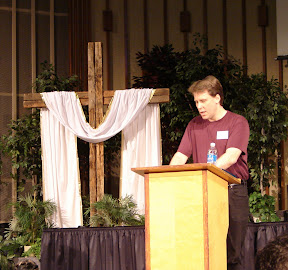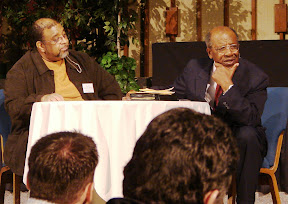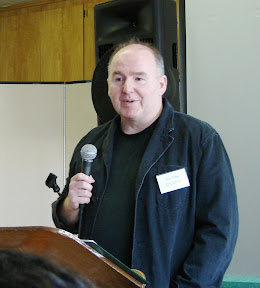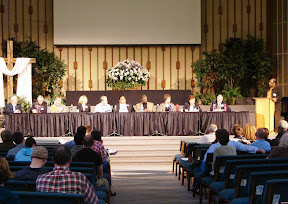 |
| Paul Louis Metzger; Perkins 4-14-07 |
Intriguingly, one of the opening presentations was a sermon whose text was the recent Johnny Cash life-story film, Walk the Line, which we had coincidentally seen just a few days earlier. The presenter was Paul Louis Metzger, director of the Institute for the Theology of Culture: New Wine, New Wineskins (which sponsored the conference), and a professor at the nearby seminary. His call to all of us was to move "from solitary confinement to solidarity with others." Several times he explicitly called for evangelicals and liberals to work together in mutual respect.
The main draw for me was the keynote speaker, John Perkins, founder of Voice of Calvary Ministries and a number of other organizations dedicated to black Christian leadership and community development and racial reconciliation. As I wrote a couple of years ago, I spent the summer of 1975 at Voice of Calvary's original location, Mendenhall, Mississippi, and have seen John Perkins only once since, so this was a reunion I was really looking forward to.
 |
| Henry Greenidge (moderator) and John Perkins; Perkins 4-14-07 |
"Talk about 'Free the Captives'--we're talking about freeing ourselves. Prisons are a reflection of our captivity to the culture."
"We have to go beyond symptoms. Churches that only deal with symptoms and don't go beyond to the culture, the cause, become co-victims. Read Psalm 11--We are caulking the cracks--we're putting all our energy into caulking the cracks--but the foundation continues to weaken.... The foundation of society is family and the community. The greatest Christian value is not individualism but community."
"The prodigal son is the righteous one, not the boy who stayed home. The prodigal found out that his life was messed up."
"So, what can the righteous do?" (reconstructed from hasty scribbles; not verbatim!)
- Find the truth--you'll find it in the Word of God. You need to have faith, and faith comes from the Word of God; faith comes from hearing. Islam has power because they're operating by a book; we're operating by folklore....
- We need to relearn prayer. Real prayer is 'Lord, what do you want me to do?' The 'name it and claim it' people have hijacked prayer.
- Decolonize the gospel. ... White folks had black folks looking up at heaven while white folks colonized the earth. But that's not how it is in heaven. The church on earth ought to reflect heaven. Some say we don't like the same music: black folks like loud music, white folks like quiet music. So now we're worshipping music?! We have to get rid of these superficial excuses.
- The church has to become missional. ... The prison that rehabilitates is the prison where the church has been established. The church is where we're nurtured and equipped to do ministry. If your church isn't doing anything, start another church that is. Get yourself six other people and start a church right in the midst of the problem.
- You have to develop a philosophy of ministry. The first person your church ought to have fulltime is a youth worker ... Let the pastor be half-time until you have a full-time youth worker.
Finally, in response to an other question, he observed that white people in mission and ministry are sometimes too caught up with plans and success. (My own observation is that this may culturally be a "white" style, but it is certainly not limited to those of European origin.) His point: if you go into a situation with five-year plans and ministry goals, you're just going to recolonize the place. First priority is to relocate, and only then, after relationships are established, do you make plans--collaboratively.
 |
| Ron Pate; Perkins 4-14-07 |
"We typically look at the church outside of culture--whether that is valid or not. But that culture continues to shape everything we do as a church. ... When individualism controls our helping of other people, that help falls short in a number of ways:
- it's self referential, relying on our judgment of their needs rather than their actual needs [what Perkins would call another form of colonization];
- our actions are about us, not the person; we fall into the 'self-validation sydrome,' perpetuating the differences between us, demoralizing and depersonalizing ; perpetuates the differences, demoralizes, depersonalizes everyone;
- it facilitates a therapeutic culture of one-way service delivery to meet the needs of people as we've projected those needs on them."
Even a so-called "community" can be shaped by a spirit of individualism. Individualistic communitarianism is a closed system that becomes triumphalistic and defensive, ascribing to itself a self-perpetuating savior role, perceiving people as problems with legs rather that the way a true community sees whole people and invites them in. (Pate recommended the books Becoming a Theologian of the Cross by Gerhard Forde and The Call to Personhood: A Christian Theory of the Individual in Social Relationships by Alistair Iain McFadyen.)
The antidote to individualistic communitarianism is to become persons in community in the spirit of the Triune God. This personhood is
- dialogical, formed through personal interaction;
- dialectical, never coming to rest in a final unity and not propped up with static identities.
 |
| Community panel; Perkins 4-14-07 |
As fascinating as the panel itself was, I was especially pleased to see many people becoming aware of the full extent of the community's resources for those who were in prison, approaching the end of their term, and recently released. Example: one person in the audience was a small businessman who wanted to hire ex-offenders but didn't know what support was available to integrate them into a work culture. Even as he was still speaking, a staff member for Better People was handing him their contact information. At the end of the day, a follow-up conference for local practitioners to organize and support each other was already being planned, to take place at Irvington Covenant Church.
 |
| Sound board; CD Party at RFC |
The hall was full of teens and young adults, and some children, enjoying the music and each other. It was delightful. All of the bands were good, but I was particularly impressed by both the musicianship and the electronics of Paperrings. (Listen to their tracks "Insecure" and "Fake it All." The Web sites all have sample tracks; judge for yourself!) Interestingly, all of the young musicians sang their songs in English.
|
|
|
|
A glimpse of Virginia Tech through the eyes of Intervarsity Christian Fellowship. (Thanks to IVCF at Reed College.)
"Evangelicals on the Left? How Shocking! How Awful!"
Liberty, equality, fraternity, and arid emptiness: Danny Kruger on "The Right Dialectic." Does anyone else see an affinity with Jim Wallis's God's Politics? Thanks to Andrew Sullivan, who set the context here; he quotes a longer version of Kruger's essay, including a fascinating summary of Benedict XVI's concern about "the arid emptiness in Western culture."
While I'm thanking Andrew Sullivan, look at this hard-to-put-down graphic novel. (l followed Sullivan's link from here.)
The U.S. embassy in Moscow presents an online exhibit commemorating 200 years of U.S.-Russian diplomatic relations. (Thanks to Johnson's Russia List.)
A little over two years ago I described my conversion from a "too nice for me" skeptic to a Derek Trucks fan. I'm glad to see a few Youtube clips to help explain what persuaded me, among them this delicious version of "Key to the Highway":




Dear Johan, My daughter lives in Blacksburg, along with her partner, who is a student at Virginia Tech. They were not directly involved in the masssacre.
ReplyDeleteOn TV I saw and heard Franklin Graham saying that the Devil, not God, was responsible for this great evil. He also said only faith in Jesus Christ would lead to salvation. He said he had about 15 assistants preaching and counseling with him.
To my mind, no human being has a good explanation for the mystery of evil. Why do bad things happen to good people, and terrible things happen to a great university? The Truth is, I believe, that we do not know.
We do know, through our faith in Christ, that God suffers with us. Even this knowledge does not help us unless it can lead us to forgiveness, not hatred. I wish that the Amish and Mennonites were teaching America, not Franklin Graham, who gives evangelical Christianity a bad name.
My daughter says that people in Blacksburg were angry that President Bush, who is responsible for countless thousands of deaths, came to Blacksburg to speak. I think that many will be angry at Franklin Graham also. I think that the Christians at Virginia Tech will be helped by IVCF, but few others. God is not under our control.
God is not under our control, but God is present to us in all situations. IVCF appears to be focusing on God understanding suffering and being present with us in it. I would hope that some students who may not be active Christians would be able to hear that, and obtain some comfort.
ReplyDeleteI'm glad to see that IVCF is ministering from a starting point of existing relationships within the student body. According to some media reports, the Virginia Tech community is growing weary of outside interventions.
ReplyDeleteEvangelicals on the Left? I do hope, hope, hope you've read Randall Balmer's fabulous book "Thy Kingdom Come: An Evangelical's Lament." Must-read if you're an evangelical who has not yet found "Be thou a Republican" in Holy Scripture.
ReplyDeleteP. J. Nugent
Kaimosi, Kenya